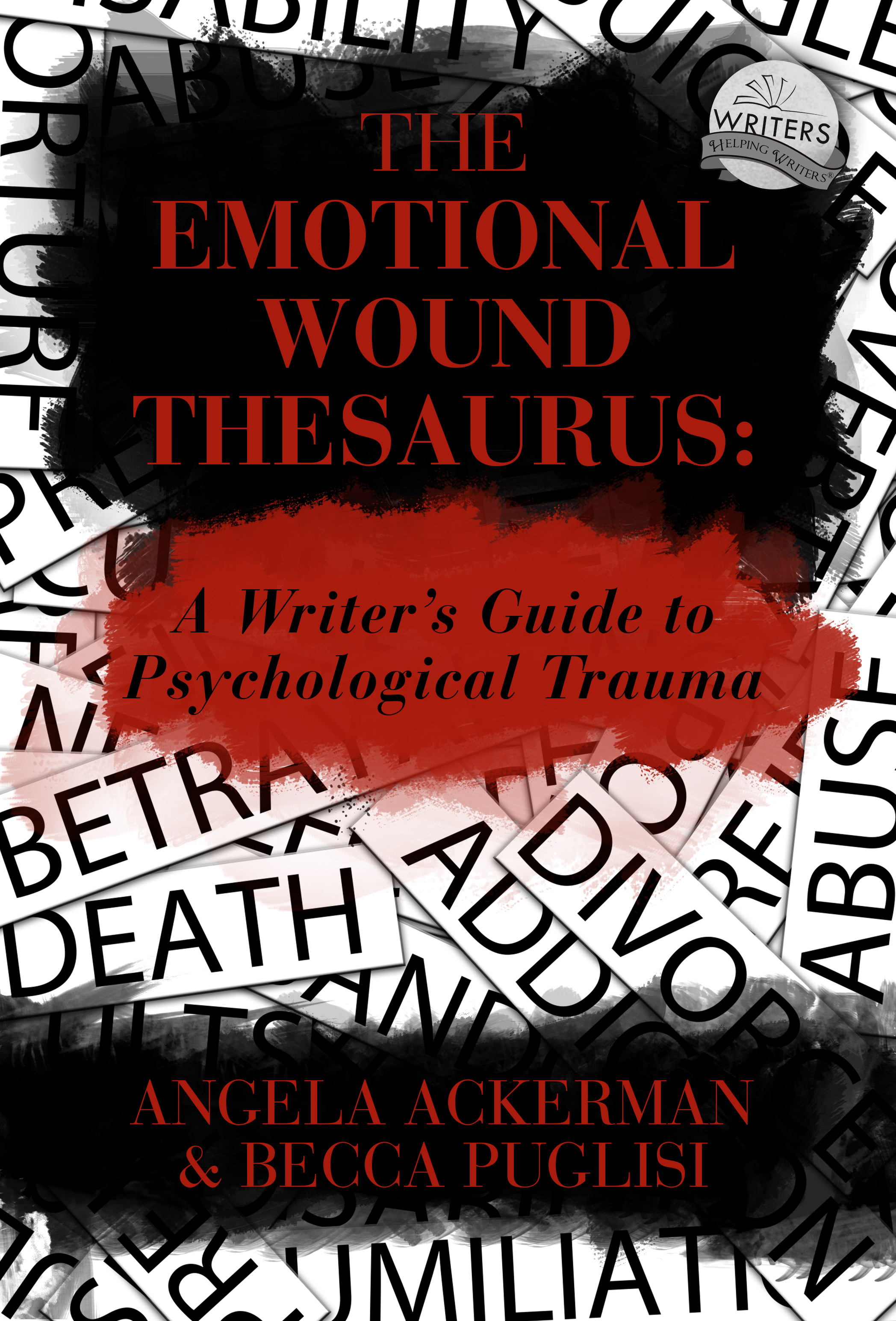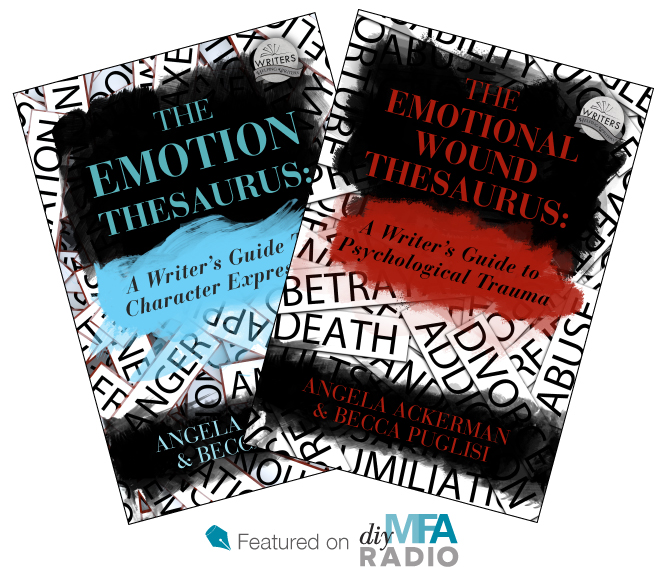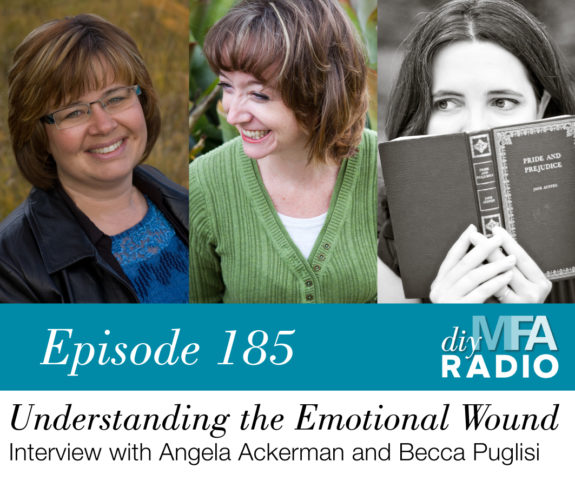Hey there word nerds!
Today I am so excited to have bestselling co-authors Angela Ackerman and Becca Puglisi on the show!
Angela and Becca co-founded the popular Writers Helping Writers site, a hub where authors can hone their craft, as well as One Stop for Writers, an innovative online library built to help writers elevate their storytelling. I happen to be part of their current cohort of Resident Writing Coaches on Writers Helping Writers and have been a longtime fan of their work.
They are also both writing coaches and international speakers, and their books are available in five languages, are sourced by US universities, and are used by novelists, screenwriters, editors, and psychologists around the world.
Angela and Becca’s popular Writer’s Thesauruses series is now up to fourteen books in total with their latest edition, The Emotional Wound Thesaurus, which is available now.
Listen in as we chat about their latest thesaurus, and dig deep into what an emotional wound is and how to use to create more believable characters.
In this episode Angela, Becca, and I discuss:
- Tips to find and use a character’s emotional wound to draw your readers in.
- Avoiding the research rabbit hole, finding what you need to know to write the story.
- What “show don’t tell” really means and how to do it right.
- Backstory, when to use it and why.
- The want, the wound, and the desire,how to combine them in your characters.
Plus, each of these ladies’ #1 tip for writers.
About Angela Ackerman
Angela, an apologetic Canadian, lives near Calgary, Alberta, nestled close to the Rockies. She enjoys traveling with her family, exploring new and unusual places, and is constantly amazed at how the universe seems to help her connect to the very people she needs at just the right time.
The author of 6 bestselling resource books printed in 6 different languages, Angela has a passion for writing craft. She is a writing coach, international speaker, and a firm believer that writers succeed best together. The desire to help writers in new, innovative ways is a love she shares with Becca Puglisi and Lee Powell, and together the three created One Stop for Writers®, a unique site filled with custom tools and writing resources built to help writers elevate their storytelling.
About Becca Puglisi
In her former life, Becca Puglisi was a teacher—elementary, because six-year-olds are easy to push around and the math isn’t too hard. She read roughly a gajillion picture books to her students, and it was her love for these books that originally motivated her to become an author, though she’s since moved on to young adult novels.
Now, Becca is a YA fantasy/historical fiction writer and co-author of a number of descriptive thesauruses for writers, including the bestselling The Emotion Thesaurus and it’s latest sequel, The Emotional Wound Thesaurus. She also is co-founder of One Stop For Writers®, a unique online resource containing many helpful tools, craft tutorials, and the entire Writers Helping Writers thesaurus collection (cross-referenced and searchable!). Becca is an international speaker who enjoys teaching workshops and presenting various writerly topics. Her books are represented by foreign rights agent Marleen Seegers of 2 Seas Agency.
During her free time (ha), Becca enjoys playing video games, watching movies, teaching Bible studies, baking, and adding to her stash of emergency supplies. She has always enjoyed contemplating the What if? scenario, which served her well when she lived in south Florida and will help her survive the winter now that she’s moved to New York.
To connect with both Angela and Becca check out their website at www.writershelpingwriters.net. And to gain access to their numerous writing resources (including the entire thesaurus series) check out onestopforwriters.com.
 The Emotional Wound Thesaurus: A Writer’s Guide to Psychological Trauma
The Emotional Wound Thesaurus: A Writer’s Guide to Psychological Trauma
Readers connect to characters with depth, ones who have experienced life’s ups and downs. To deliver key players that are both realistic and compelling, writers must know them intimately—not only who they are in the present story, but also what made them that way.
Of all the formative experiences in a character’s past, none are more destructive than emotional wounds. The aftershocks of trauma can change who they are, alter what they believe, and sabotage their ability to achieve meaningful goals, all of which will affect the trajectory of your story. Identifying the backstory wound is crucial to understanding how it will shape your character’s behavior, and The Emotional Wound Thesaurus can help.
Inside, you’ll find:
- A database of traumatic situations common to the human experience
- An in-depth study on a wound’s impact, including the fears, lies, personality shifts, and dysfunctional behaviors that can arise from different painful events
- An extensive analysis of character arc and how the wound and any resulting unmet needs fit into it
- Techniques on how to show the past experience to readers in a way that is both engaging and revelatory while avoiding the pitfalls of info dumps and telling
- A showcase of popular characters and how their traumatic experiences reshaped them, leading to very specific story goals
- A Backstory Wound Profile tool that will enable you to document your characters’ negative past experiences and the aftereffects.
Root your characters in reality by giving them an authentic wound that causes difficulties and prompts them to strive for inner growth to overcome it. With its easy-to-read format and over 100 entries packed with information, The Emotional Wound Thesaurus is a crash course in psychology for creating characters that feel incredibly real to readers.

If you decide to check out The Emotional Wound Thesaurus, The Emotion Thesaurus, or any of the Writers’ Thesauruses listed below, we hope you’ll do so via these Amazon Affiliate Links, where if you choose to purchase via the links DIY MFA gets a referral fee at no cost to you. As always, thank you for supporting DIY MFA!
And remember to check out Angela’s and Becca’s other thesauruses only on onestopforwriters.com.
Link to Episode 185
(Right-click to download.)
If you liked this episode…
Head over to iTunes, Stitcher Radio or Google Play and subscribe so you’ll be first to know when new episodes are available.
Also, remember that sharing is caring so if you know anyone who might enjoy this podcast, please tell them about it or leave us a review so other listeners will want to check it out.
Until next week, keep writing and keep being awesome!








